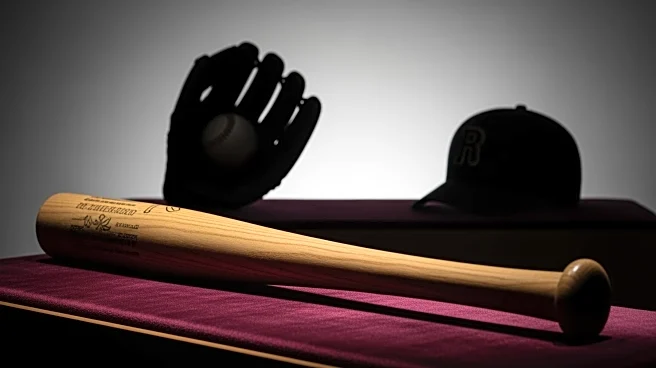What's Happening?
The Baseball Hall of Fame's contemporary baseball era committee has announced its 2025 ballot, which includes notable figures such as Barry Bonds, Roger Clemens, Don Mattingly, and Dale Murphy. These individuals were retained from previous ballots and will
be joined by Carlos Delgado, Jeff Kent, Gary Sheffield, and Fernando Valenzuela. The committee, consisting of 16 members, will convene on December 7 at the winter meetings in Orlando, Florida, where a 75% vote is required for election. Successful candidates will be inducted on July 26, alongside those selected by the Baseball Writers’ Association of America, whose vote will be announced on January 20. The Hall of Fame has restructured its veterans committees, creating panels to evaluate the contemporary era from 1980 onwards, as well as the classic era. This restructuring allows for separate ballots for players and another for managers, executives, and umpires.
Why It's Important?
The inclusion of Barry Bonds and Roger Clemens on the Hall of Fame ballot is significant due to their controversial histories with performance-enhancing drugs. Bonds, a seven-time NL MVP, holds the career home run record, while Clemens, a seven-time Cy Young Award winner, is third in career strikeouts. Their potential induction could influence the Hall of Fame's stance on players associated with performance-enhancing drugs. Additionally, the restructuring of the veterans committees reflects an evolving approach to recognizing contributions to baseball, potentially impacting how future candidates are evaluated. This ballot also highlights the ongoing debate about the criteria for Hall of Fame induction, particularly concerning players with contentious legacies.
What's Next?
The committee's decision in December will be closely watched, as it could set a precedent for how players linked to performance-enhancing drugs are treated in future Hall of Fame considerations. The outcome may also prompt reactions from baseball historians, fans, and analysts, potentially influencing public opinion and the Hall's future policies. The next opportunity for contemporary managers, executives, and umpires to be considered will be in December 2026, while classic era candidates will be evaluated in December 2027. The Hall's decision to allow Pete Rose to appear on a ballot posthumously, following the end of his permanent suspension, may also spark discussions about the eligibility of other players with controversial pasts.
Beyond the Headlines
The Hall of Fame's evolving criteria and committee structures reflect broader cultural shifts within baseball and sports in general. As the sport grapples with its history of performance-enhancing drugs, the decisions made by the Hall of Fame could influence how future generations perceive the legacies of players from this era. The inclusion of players like Bonds and Clemens on the ballot, despite their associations with steroids, suggests a potential shift towards a more inclusive and forgiving approach to baseball's complex history.

















